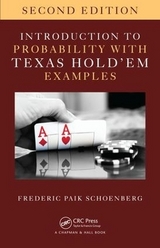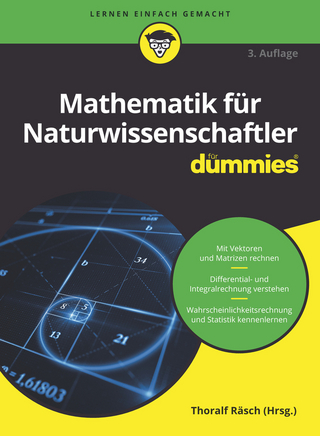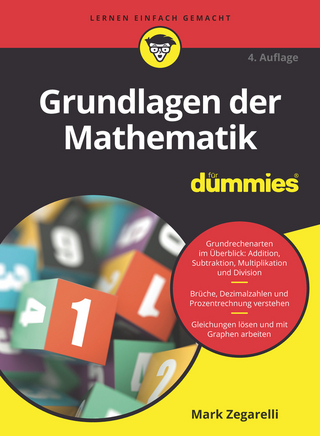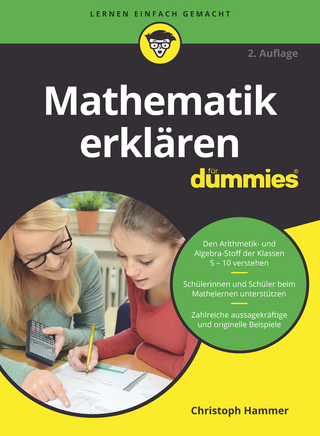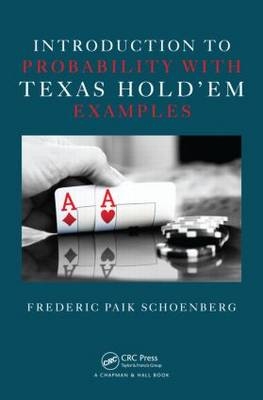
Introduction to Probability with Texas Hold’em Examples
Taylor & Francis Inc (Verlag)
978-1-4398-2768-0 (ISBN)
- Titel erscheint in neuer Auflage
- Artikel merken
This classroom-tested book covers the main subjects of a standard undergraduate probability course, including basic probability rules, standard models for describing collections of data, and the laws of large numbers. It also discusses several more advanced topics, such as the ballot theorem, the arcsine law, and random walks, as well as some specialized poker issues, such as the quantification of luck and skill in Texas Hold’em. Homework problems are provided at the end of each chapter.
The author includes examples of actual hands of Texas Hold’em from the World Series of Poker and other major tournaments and televised games. He also explains how to use R to simulate Texas Hold’em tournaments for student projects. R functions for running the tournaments are freely available from CRAN (in a package called holdem).
See Professor Schoenberg discuss the book.
Frederic Paik Schoenberg is a professor and graduate vice-chair of statistics at UCLA. He is also co-editor of the Journal of Environmental Statistics. He earned a Ph.D. in statistics from UC Berkeley. His research interests include point processes, image analysis, time series, and applications in seismology and fire ecology.
Probability Basics
Meaning of Probability
Basic Terminology
Axioms of Probability
Venn Diagrams
General Addition Rule
Counting Problems
Sample Spaces with Equally Probable Events
Multiplicative Counting Rule
Permutations
Combinations
Conditional Probability and Independence
Conditional Probability
Independence
Multiplication Rules
Bayes’ Rule and Structured Hand Analysis
Expected Value and Variance
Cumulative Distribution Function and Probability Mass Function
Expected Value
Pot Odds
Luck and Skill in Texas Hold’em
Variance and Standard Deviation
Markov and Chebyshev Inequalities
Moment Generating Functions
Discrete Random Variables
Bernoulli Random Variables
Binomial Random Variables
Geometric Random Variables
Negative Binomial Random Variables
Poisson Random Variables
Continuous Random Variables
Probability Density Functions
Expected Value, Variance, and Standard Deviation
Uniform Random Variables
Exponential Random Variables
Normal Random Variables
Pareto Random Variables
Continuous Prior and Posterior Distributions
Collections of Random Variables
Expected Value and Variance of Sums of Random Variables
Conditional Expectation
Laws of Large Numbers and the Fundamental Theorem of Poker
Central Limit Theorem
Confidence Intervals for the Sample Mean
Random Walks
Simulation and Approximation Using Computers
Appendix A: Abbreviated Rules of Texas Hold’em
Appendix B: Glossary of Poker Terms
Appendix C: Solutions to Selected Odd-Numbered Exercises
References and Suggested Reading
Index
Exercises appear at the end of each chapter.
| Zusatzinfo | 12/14- More corrections done to the book - SEE NOTES 2nd print; 34 Illustrations, black and white |
|---|---|
| Verlagsort | Washington |
| Sprache | englisch |
| Maße | 156 x 235 mm |
| Gewicht | 336 g |
| Themenwelt | Mathematik / Informatik ► Mathematik ► Allgemeines / Lexika |
| Mathematik / Informatik ► Mathematik ► Wahrscheinlichkeit / Kombinatorik | |
| ISBN-10 | 1-4398-2768-0 / 1439827680 |
| ISBN-13 | 978-1-4398-2768-0 / 9781439827680 |
| Zustand | Neuware |
| Haben Sie eine Frage zum Produkt? |
aus dem Bereich
